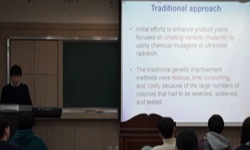Objective: The molecular classification system of endometrial carcinoma (EC) in ‘The Cancer Genome Atlas’ is widely acknowledged for its prognostic utility. Subsequently, more simplified classification system that incorporate DNA polymerase epsilo...
http://chineseinput.net/에서 pinyin(병음)방식으로 중국어를 변환할 수 있습니다.
변환된 중국어를 복사하여 사용하시면 됩니다.
- 中文 을 입력하시려면 zhongwen을 입력하시고 space를누르시면됩니다.
- 北京 을 입력하시려면 beijing을 입력하시고 space를 누르시면 됩니다.



Clinicopathological and molecular characterization of high-grade endometrial carcinoma with POLE mutation: a single center study
한글로보기https://www.riss.kr/link?id=A108183659
-
저자
Shuangni Yu (Department of Pathology, Peking Union Medical College Hospital, Chinese Academy of Medical Sciences and Peking Union Medical College, Beijing, China) ; Zezheng Sun (Department of Pathology, Peking Union Medical College Hospital, Chinese Academy of Medical Sciences and Peking Union Medical College, Beijing, China) ; Liju Zong (Department of Pathology, Peking Union Medical College Hospital, Chinese Academy of Medical Sciences and Peking Union Medical College, Beijing, China) ; Jie Yang (Peking Union Medical College Hospital) ; Mei Yu (Department of Obstetrics and Gynecology, Peking Union Medical College Hospital, Chinese Academy of Medical Sciences and Peking Union Medical College, Beijing, China) ; Jie Chen (Peking Union Medical College Hospital) ; Zhaohui Lu (Department of Pathology, Peking Union Medical College Hospital, Chinese Academy of Medical Sciences and Peking Union Medical College, Beijing, China)
- 발행기관
- 학술지명
- 권호사항
-
발행연도
2022
-
작성언어
English
- 주제어
-
등재정보
KCI등재,SCIE,SCOPUS
-
자료형태
학술저널
- 발행기관 URL
-
수록면
1-14(14쪽)
-
KCI 피인용횟수
0
- DOI식별코드
- 제공처
-
0
상세조회 -
0
다운로드
부가정보
다국어 초록 (Multilingual Abstract)
Objective: The molecular classification system of endometrial carcinoma (EC) in ‘The Cancer Genome Atlas’ is widely acknowledged for its prognostic utility. Subsequently, more simplified classification system that incorporate DNA polymerase epsilon (POLE) exonuclease domain mutations, mismatch repair deficiencies (MMRd), and abnormal p53 (P53abn) has also demonstrated its clinical utility. These classifications helped identifying a ‘POLE ultramutated’ (POLEmut) category of patients, most of whom show excellent prognoses despite having high-grade ECs. We aimed to investigate the clinicopathological and molecular characteristics of high-grade ECs with POLEmut.
Methods: We investigated 414 patients with high-grade ECs (including endometrioid carcinomas grade 3, serous carcinomas, clear cell carcinomas, mixed carcinomas, undifferentiated and dedifferentiated carcinomas, and carcinosarcomas) by sequencing and immunohistochemical staining.
Results: Forty-three tumors (10.4%) were classified as POLEmut, including 2 with new, possibly pathogenic POLE mutations at P286C and L424V. These patients had very good prognoses except for 1 with stage IV disease and residual tumor. Eleven patients in this group also had P53abn and 4 had MMRd; molecular analysis revealed that patients with synchronous POLE pathogenic mutation and other mutations had a POLEmut or MMRd phenotype; survival analysis found no difference in prognosis between these patient categories. The prognoses of patients in the POLEmut EC group were not significantly influenced by treatment or risk category.
Conclusions: Patients with high-grade EC exhibiting POLEmut have very good clinical outcomes, and should be identified urgently in daily work owing to their conflicting morphology. Our findings also provide guidance on subclassifying ECs with poor histological appearance.
참고문헌 (Reference)
1 Singh N, "p53 immunohistochemistry is an accurate surrogate for TP53 mutational analysis in endometrial carcinoma biopsies" 250 : 336-345, 2020
2 Alexandrov LB, "Signatures of mutational processes in human cancer" 500 : 415-421, 2013
3 Church DN, "Prognostic significance of POLE proofreading mutations in endometrial cancer" 107 : 402-, 2014
4 Hodel KP, "POLE mutation spectra are shaped by the mutant allele identity, its abundance, and mismatch repair status" 78 : 1166-1177, 2020
5 Talhouk A, "Molecular subtype not immune response drives outcomes in endometrial carcinoma" 25 : 2537-2548, 2019
6 Bosse T, "Molecular classification of grade 3 endometrioid endometrial cancers identifies distinct prognostic subgroups" 42 : 561-568, 2018
7 León-Castillo A, "Interpretation of somatic POLE mutations in endometrial carcinoma" 250 : 323-335, 2020
8 Cancer Genome Atlas Research Network, "Integrated genomic characterization of endometrial carcinoma" 497 : 67-73, 2013
9 Vermij L, "Incorporation of molecular characteristics into endometrial cancer management" 76 : 52-63, 2020
10 Yano M, "Impact of TP53 immunohistochemistry on the histological grading system for endometrial endometrioid carcinoma" 32 : 1023-1031, 2019
1 Singh N, "p53 immunohistochemistry is an accurate surrogate for TP53 mutational analysis in endometrial carcinoma biopsies" 250 : 336-345, 2020
2 Alexandrov LB, "Signatures of mutational processes in human cancer" 500 : 415-421, 2013
3 Church DN, "Prognostic significance of POLE proofreading mutations in endometrial cancer" 107 : 402-, 2014
4 Hodel KP, "POLE mutation spectra are shaped by the mutant allele identity, its abundance, and mismatch repair status" 78 : 1166-1177, 2020
5 Talhouk A, "Molecular subtype not immune response drives outcomes in endometrial carcinoma" 25 : 2537-2548, 2019
6 Bosse T, "Molecular classification of grade 3 endometrioid endometrial cancers identifies distinct prognostic subgroups" 42 : 561-568, 2018
7 León-Castillo A, "Interpretation of somatic POLE mutations in endometrial carcinoma" 250 : 323-335, 2020
8 Cancer Genome Atlas Research Network, "Integrated genomic characterization of endometrial carcinoma" 497 : 67-73, 2013
9 Vermij L, "Incorporation of molecular characteristics into endometrial cancer management" 76 : 52-63, 2020
10 Yano M, "Impact of TP53 immunohistochemistry on the histological grading system for endometrial endometrioid carcinoma" 32 : 1023-1031, 2019
11 Palles C, "Germline mutations affecting the proofreading domains of POLE and POLD1 predispose to colorectal adenomas and carcinomas" 45 : 136-144, 2013
12 Kommoss S, "Final validation of the ProMisE molecular classifier for endometrial carcinoma in a large population-based case series" 29 : 1180-1188, 2018
13 WHO Classification of Tumours Editorial Board, "Female genital tumours. WHO classification of tumours, 5th edition, volume 4" World Health Organization 252-266, 2020
14 Shinbrot E, "Exonuclease mutations in DNA polymerase epsilon reveal replication strand specific mutation patterns and human origins of replication" 24 : 1740-1750, 2014
15 McAlpine JN, "Evaluation of treatment effects in patients with endometrial cancer and POLE mutations : an individual patient data meta-analysis" 127 : 2409-2422, 2021
16 McConechy MK, "Endometrial carcinomas with POLE exonuclease domain mutations have a favorable prognosis" 22 : 2865-2873, 2016
17 Colombo N, "ESMO-ESGOESTRO Consensus Conference on Endometrial Cancer : diagnosis, treatment and follow-up" 27 : 16-41, 2016
18 Concin N, "ESGO/ESTRO/ESP guidelines for the management of patients with endometrial carcinoma" 31 : 12-39, 2021
19 Haradhvala NJ, "Distinct mutational signatures characterize concurrent loss of polymerase proofreading and mismatch repair" 9 : 1746-, 2018
20 Yu S, "Detection of POLE subtypes in high-grade endometrioid carcinoma by BaseScope-ISH assay" 9 : 831-, 2019
21 Alexandrov LB, "Deciphering signatures of mutational processes operative in human cancer" 3 : 246-259, 2013
22 Church DN, "DNA polymerase ε and δexonuclease domain mutations in endometrial cancer" 22 : 2820-2828, 2013
23 Talhouk A, "Confirmation of ProMisE : a simple, genomics-based clinical classifier for endometrial cancer" 123 : 802-813, 2017
24 He Y, "Clinicopathological characteristics and prognostic value of POLE mutations in endometrial cancer: a systematic review and meta-analysis" 99 : e19281-, 2020
25 León-Castillo A, "Clinicopathological and molecular characterisation of ‘multiple-classifier’ endometrial carcinomas" 250 : 312-322, 2020
26 Stasenko M, "Clinical outcomes of patients with POLE mutated endometrioid endometrial cancer" 156 : 194-202, 2020
27 Van Gool IC, "Adjuvant treatment for POLE proofreading domain-mutant cancers : sensitivity to radiotherapy, chemotherapy, and nucleoside analogues" 24 : 3197-3203, 2018
동일학술지(권/호) 다른 논문
-
HPV vaccination among seropositive, DNA negative cohorts: a systematic review & meta-analysis
- 대한부인종양학회
- Colm Mac Eochagain
- 2022
- KCI등재,SCIE,SCOPUS
-
Treatment and outcomes in undifferentiated and dedifferentiated endometrial carcinoma
- 대한부인종양학회
- Sarah Nicole Hamilton
- 2022
- KCI등재,SCIE,SCOPUS
-
- 대한부인종양학회
- Hiroko Machida
- 2022
- KCI등재,SCIE,SCOPUS
-
- 대한부인종양학회
- Yuan Li
- 2022
- KCI등재,SCIE,SCOPUS
분석정보
인용정보 인용지수 설명보기
학술지 이력
| 연월일 | 이력구분 | 이력상세 | 등재구분 |
|---|---|---|---|
| 2023 | 평가예정 | 해외DB학술지평가 신청대상 (해외등재 학술지 평가) | |
| 2020-01-01 | 평가 | 등재학술지 유지 (해외등재 학술지 평가) |  |
| 2012-07-13 | 학회명변경 | 한글명 : 대한부인종양콜포스코피학회 -> 대한부인종양학회영문명 : Korean Society of Gynecologic Oncology and Colposcopy -> Korean Society of Gynecologic Oncology |  |
| 2012-01-01 | 평가 | 등재학술지 선정 (등재후보2차) |  |
| 2011-01-01 | 평가 | 등재후보 1차 PASS (등재후보1차) |  |
| 2010-01-01 | 평가 | 등재후보학술지 유지 (등재후보2차) |  |
| 2009-01-01 | 평가 | 등재후보 1차 PASS (등재후보1차) |  |
| 2008-06-26 | 학술지명변경 | 한글명 : 부인종양 -> Journal of Gynecologic Oncology외국어명 : Korean Journal of Gynecologic Oncology -> Journal of Gynecologic Oncology |  |
| 2008-01-01 | 평가 | 등재후보 1차 FAIL (등재후보1차) |  |
| 2007-01-01 | 평가 | 등재후보학술지 유지 (등재후보1차) |  |
| 2006-09-13 | 학술지명변경 | 한글명 : 대한부인종양.콜포스코피학회지 -> 부인종양외국어명 : 미등록 -> Korean Journal of Gynecologic Oncology |  |
| 2005-01-01 | 평가 | 등재후보학술지 선정 (신규평가) |  |
학술지 인용정보
| 기준연도 | WOS-KCI 통합IF(2년) | KCIF(2년) | KCIF(3년) |
|---|---|---|---|
| 2016 | 2.18 | 0.12 | 1.48 |
| KCIF(4년) | KCIF(5년) | 중심성지수(3년) | 즉시성지수 |
| 1.13 | 0.9 | 0.732 | 0 |




 KCI
KCI






